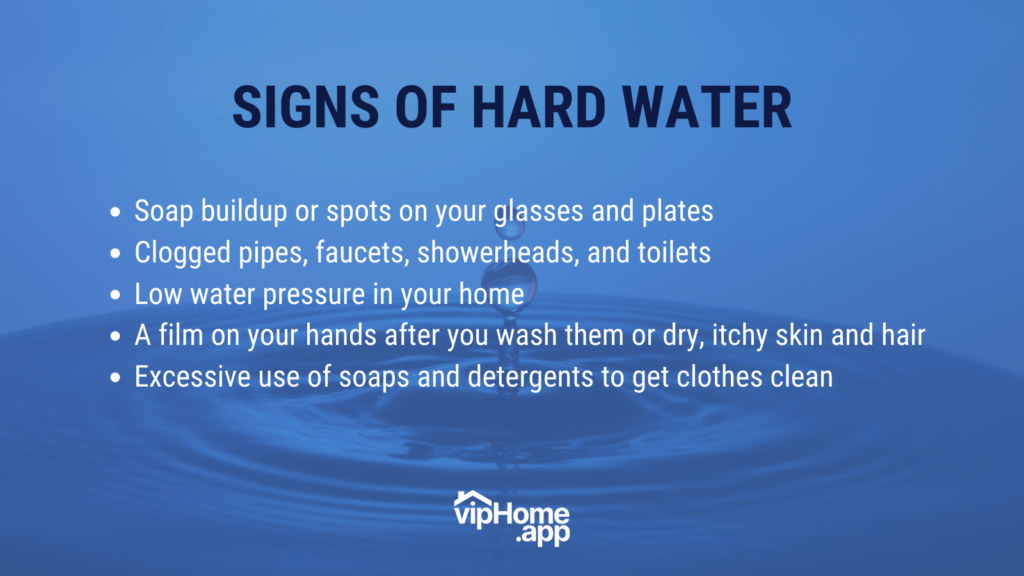If your water quality test came back showing hard water, it’s not a reason to panic.
“[Hard water] is dangerous to your pipes, your water heater and your appliances,” says Eric Yeggy, Technical Affairs Director for the Water Quality Association. “There’s very good reasons to remove it, but it isn’t going to give you cancer.”
Although it may sound scary, hard water is just water with high mineral content usually in the form of calcium and magnesium.

Thankfully, hard water is safe to drink. Unfortunately, hard water isn’t safe for your fixtures and appliances, so how do you reduce the effects of hard water in your home?
The solution: water softeners
Can hard water ruin a water heater? The answer is yes, but it can ruin much more than that. A study commissioned by the Water Quality Research Foundation and conducted by the Battelle Memorial Institution found that showerheads using hard water lost 75% of their flow rate in 18 months. Faucet strainers clogged in just 19 days.
The same study concluded that hot water heaters using soft water “maintained their original factory efficiency rating for as long as 15 years,” says Eric, “while running hard water through those units cut the efficiency by 48%. The underlying problem here is that a very small amount of scale greatly reduces the efficiency of the heat exchange between a heating element and water.”
A water softener allows water heaters and major appliances to operate at their advertised energy efficiency while also preventing clogs that lower the efficiency of shower heads, faucets, and drains.

Softeners can also be beneficial to the human body by removing some dangerous contaminants from water sources.
“For example, [softeners] will preferentially remove radiological contaminants,” says Eric. “If you have an issue with radiological contaminants because you’re on a deep well, a softener is a great solution to remove those.”
Softening the hard water blow
Installing a cation exchange water softener is one of the best ways to reduce hardness in home water.
“It removes calcium and magnesium ions, which cause the scale to form,” says Eric. “It replaces them with other ions, typically sodium or potassium.”
By exchanging these ions, instead of simply removing them, the softener prevents the formation of scale. It also allows the water chemistry to stabilize. Thus, the water doesn’t become corrosive and cause damage to your pipes or fixtures.

Typically once a week, the softener will regenerate itself using salt, so homeowners need to occasionally check the tank’s salt level and refill it when indicated in the service manual.
“There’s also services available, which you can purchase, that can deliver salt to your home or even perform this type of routine salt maintenance for you,” says Eric.
When searching for a water softener
Always check to make sure you’re actually purchasing a water softener as this term is sometimes used in an unethical way.
“A lot of companies will use the term ‘softener’ to imply that a specific device softens water when it really isn’t,” says Eric.
Look for softeners that are certified to standard NSF/ANSI44. NSF stands for NSF International, and ANSI stands for the American National Standards Institute. Forty-four is the number of the standard.
“When you buy a water softener with this certification, you know it’s been tested and has proven its ability,” says Eric.
There’s another standard – IMOZ 601 – which covers alternative scale prevention devices, but “unfortunately there’s no products which have successfully been certified to that standard that I’m aware of yet,” says Eric.
Search water softeners independently certified by WQA to NSF/ANSI 44 now!
On a sodium- or potassium-restricted diet? Read this.

Since water softeners use salt, homeowners on sodium-restricted diets should consult their doctor before installing a water softener system. This way, you can discuss options for water treatment systems.
“If you are on a restricted sodium diet, softeners are oftentimes installed so that there’s a separate tap for drinking water that is not softened,” says Eric. “You can also install something underneath the sink to remove the sodium.”
Homeowners on a potassium restricted diet should also consult their physicians as softeners sometimes use potassium to soften hard water as well.
Stay on top of home maintenance
Homeownership can be hard, but it doesn’t have to be. The vipHome.app can help. In less than four minutes, enjoy a new way to manage your home. Simply download the app, register your home, and enjoy a simplified homeownership experience. Download the app today!







